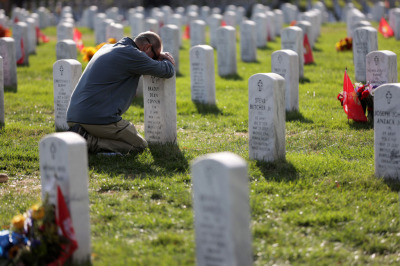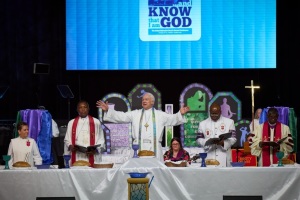John MacArthur is out of touch on combat PTSD

In a recent viral video, John MacArthur, the well-known pastor of Grace Community Church in Sun Valley, California, told attendees of a Bible conference in California “there’s no such thing as PTSD…”
MacArthur added, “What [PTSD] is, is really grief. You are fighting a war. You lost your buddies. You have a certain amount of survivors’ guilt because you made it back. They didn’t. How did you deal with the grief? Grief is a real thing, but grief is part of life. And, if you can’t navigate grief, you can’t live life.”
MacArthur, like many other faith-based leaders, has an incorrect and unbalanced view of mental health issues and solutions. His uneducated and ignorant comments demand a direct rebuttal.
His comments disregard medical research and invalidate the many experiences and subsequent struggles I’ve seen in myself and in the combat veterans I work with daily. It’s the reason I started Shield of Faith Missions, a nonprofit that helps combat veterans wrestling with mental health issues.
The effects of combat-related trauma run deep, down to the warrior’s very heart and soul. I know this from personal experience.
As a former special operations officer, I was deployed to Iraq and Afghanistan multiple times. My most harrowing experience, by far, came when I deployed to the infamous Korengal Valley – known as "The Valley of Death" because so many Americans have lost their lives there. Our Special Forces team was there to shut down the combat outpost. We conducted a seven-day disruption operation that involved 72-hours of intense fighting. Intelligence reported over 200 Taliban fighters in the area.
I am still reminded of the barrage of bombs through nightmares and random flashbacks. Combat leaves scars, and not all of them are physical. After enduring such extreme conditions for long periods, returning to the normalcy of civilian life is difficult. For many, war changed us—it certainly changed me.
When a soldier has experienced a traumatic event, that trauma is processed in several ways. Humans are made up of multiple domains: psychologically, physically, socially, and spiritually.
The symptoms of PTSD occur psychologically, whereas moral injury transpires under the spiritual domain. To the untrained eye, the symptoms are similar, that's why many church leaders get mixed up and are often confused. And in turn, those leaders confuse others.
Grief falls under moral injury—this is where man struggles with the forces of good and evil, God versus Satan, asking feverishly “Why God—why would you allow this to happen?”
What out-of-touch faith leaders, like MacArthur, fail to understand is that resiliency to overcome the symptoms of combat trauma is more than spiritual. Sometimes medication is needed. And yes, too often doctors toss out prescriptions to veterans like candy to kids along parade routes.
Offering reckless commentary on issues outside your expertise has real effects on real people. When confused church leaders speak on combat trauma and PTSD, warriors suffer.
The numbers are mind-blowing. The Department of Veterans Affairs reports that more than 20 veterans and active-duty service members, guardsmen, and reservists commit suicide every day in this country. That’s nearly one suicide every hour. More than 80 percent of them are veterans.
We need to build up hope and resiliency in our combat veterans. We need to work toward effective treatment that equips our brothers and sisters in arms to grow through their trauma. Increasing ignorance or spreading stigmatizing and demoralizing rhetoric is a step backward.
Church leaders should lead the way in restoring hope and pointing toward the path of healing. And I’d encourage every pastor to reach out to a veteran, build a relationship, listen to their stories and struggles, and walk alongside them. The Bible tells us to “not grow weary in doing good, for in due season we will reap, if we do not give up.”
Let us work together to sow hope and resiliency, not stigma and discouragement.
Dr. Damon Friedman, a decorated veteran of combat in Iraq and Afghanistan, retired from the Air Force as a lieutenant colonel in special operations. He is the recipient of the Spirit of Hope Award from the Secretary of Defense and founder of SOF Missions, which works with veterans with PTSD.




























